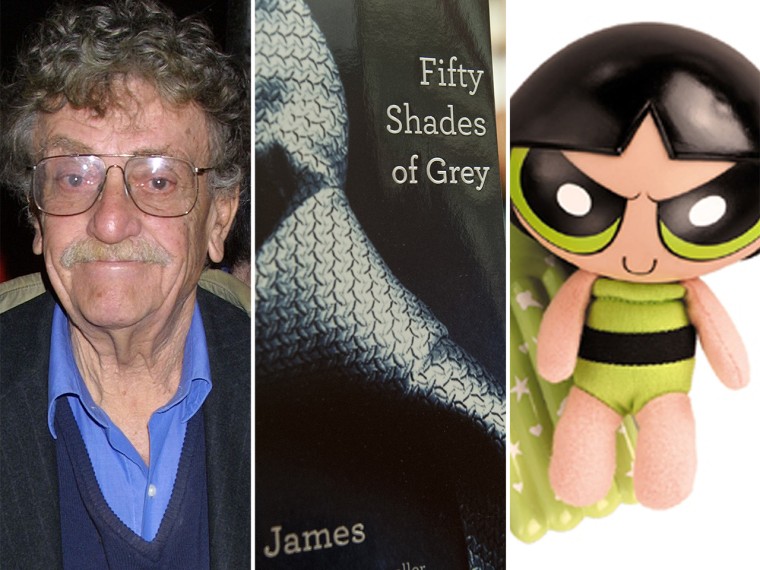Imagine a story that doesn't end just because the book ran out of pages, or final credits ran on a TV series or franchise. Imagine a world where Kirk and Spock of "Star Trek" were more than just friends, or “Harry Potter’s” Hermione helps “The X-Files’” Scully and Mulder solve supernatural crimes.
No need to imagine at all: For years, thousands of writers have been crafting just such stories and publishing them. That's the world of fan fiction.
And Amazon has added some business reality to this expansive world of fantasy. Back in May, the company announced the start of Kindle Worlds, which put new spin on this old form of storytelling. Kindle Worlds now has authorized permission to pay writers to spin off new tales that take place in the worlds of a few several TV series (“The Vampire Diaries,” “Pretty Little Liars” and “Gossip Girl”) — and the works of one literary author, Kurt Vonnegut. The decision has thrown open the doors for any writer to re-envision those universes and have their work not just published, but paid for.
Whether this is a good thing or not depends on your point of view. In a business sense, it’s a canny move. Noted Karen Hellekson co-author of “Fan Fiction and Fan Communities in the Age of the Internet” in a recent post, “(I)t’s the latest attempt by content providers to monetize fan labor. As far as that goes, it may be the best deal I've seen.” (She also makes reference to another such attempt, the short-lived FanLib site.)
Unauthorized fiction written by the fans of a particular universe — television, books, film, music — has been around for years, potentially as far back as oral storytelling. Those stories have an instant readership, since they're working with familiar characters and situations, just steered down different paths. And with the growth of the internet and the ability to reach a wider audience, these free stories — which frequently explore progressive themes — have been expanding exponentially. (Fanfiction.net is packed with spinoffs from works ranging from "Charlie and the Chocolate Factory" to "Powerpuff Girls" to "Gomer Pyle, U.S.M.C.")
But since fan fiction has traditionally lived in a gray area of legality — is it fair use? Is it copyright infringement? — the stories have generally remained in unpaid or amateur territory, often signed with pseudonyms.
Then came "50 Shades of Grey" in 2011. When that blockbuster trilogy turned out to have gotten its start as “Twilight” fan fiction, suddenly investors began hearing the ring of cash registers.
“’50 Shades’ blew the cover off of fan fiction,” says Henry Jenkins, author of the seminal “Textual Poachers: Television Fans and Participatory Culture,” and media studies professor at the University of Southern California. “After that, other writers started coming out of the closet. Now, Amazon is just saying, ‘How can we build on that success? How can we create a place where people aren’t threatened legally, and is a safe place to publish these stories?’”
The legal issues have always been tricky, says Aaron Schwabach, author of “Fan Fiction and Copyright.” “There’s a tremendous amount of misinformation out there, and not all on the fans’ side. A lot of authors have misapprehensions about what they control about their work once they've written it as well.”
Kindle Worlds, meanwhile, is problematic for many in the fan fiction communities — Schwabach reports that “fans hate it” — but the reasons are complex and myriad. For one thing, it is an attempt to co-opt what has traditionally been a gifting format: Sure, writers would like to get paid for their writing, but there’s a bond that forms in a community that that has evolved to give away its efforts for free.
“People don’t like their thing being co-opted,” says Schwabach. “By co-opting it and making some of it official, Kindle Worlds is subverting the subversion. It’s a visceral reaction (fans are having).”
Additionally, says Jenkins, “The gender politics are very real here. The majority of fan fiction is written by women who are telling stories that don’t reach the public, because Hollywood has a hard time telling stories about women's lives.”
He hopes that Amazon has women on its Kindle Worlds advisory board who understand the role women play in creating fan fiction “or they’ll get serious pushback.”
Still, whether Kindle Worlds catches on or not, fan fiction of all stripes will continue to proliferate on the internet. Some writers will contribute to both streams; some will sanitize their works and try to mainstream them into fiction publishable by more traditional routes. But if Kindle Worlds is a success, it could go anywhere.
“Who’s next?” wonders Jenkins. “John Updike? Toni Morrison? What figures are going to embrace that their stories are seeds that inspire other people, and which will be more protective of their work? That is what’s going to be the next fascinating phase of this story.”
